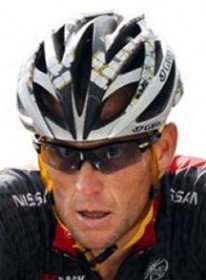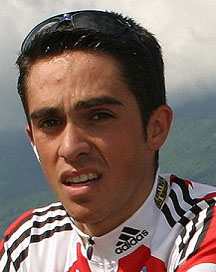PARIS, (Reuters) – Cycling in 2010 was struck by a series of crises that threatened to wipe out most of its efforts to fight doping, with the sport’s two biggest names involved in scandals.

Seven-times Tour de France champion Lance Armstrong was embroiled in a U.S. federal investigation triggered by former team mate and disgraced 2006 champion Floyd Landis’s allegations, while three-times winner Alberto Contador failed a test for the banned anabolic agent Clenbuterol.
The biological passport, a tool developed by the International Cycling Union (UCI) to help the fight against doping, showed its limitations when Italian Franco Pellizotti was eventually cleared to race even though his data suggested he had tampered with his blood.
Vuelta runner-up Ezequiel Mosquera failed a dope test, prompting UCI president Pat McQuaid to say that Spain was not doing enough to tackle the doping problem.
Elite cycling has been growing strongly in the United States, with RadioShack, Garmin, HTC-High Road and BMC Racing four of 18 elite outfits for the 2011 season, but the sport’s officials fear the scandals could drive away sponsors.
“With cycling’s degraded image because of doping and the financial crisis, it’s getting more and more difficult. The future is very uncertain,” Caisse d’Epargne team manager Francis Lafargue told Reuters during the Tour.
CURTAIN DOWN
Europe will still be a major force in 2011 as the Schleck brothers, Andy and Frank, set up their own operation, signing former Saxo Bank team mate and four-times time-trial world champion Fabian Cancellara, who achieved a rare Tour of Flanders-Paris Roubaix double. Swiss Cancellara had to fight allegations of cheating, however, after reports suggested he had used an electrical motor to power away from the pack in these two races. Pellizotti missed the Giro over suspicious data in his biological passport but the Liquigas rider was eventually cleared by the Italian National Olympic Committee (CONI) in a huge blow to the UCI’s anti-doping policy.
“We will lose some, but we will also win some (similar cases),” said McQuaid.
The UCI did win their legal battle against Spain’s Alejandro Valverde, who was suspended for two years because of his implication in the Operation Puerto blood-doping scandal. The Giro showed there was life after a doping ban, however, as Ivan Basso won the race, one of the most punishing in decades.
Armstrong brought down the curtain on an impressive career, retiring as a hero to

his devotees, though less so to his critics, when he finished a distant 23rd in the Tour.
Former team mate Landis’s allegations that Armstrong and several others had used performance-enhancing drugs triggered a federal investigation that was focusing on whether the Texan used government money to fund an alleged doping programme in his years of domination.
CONTAMINATED MEAT
Armstrong, who has never tested positive in his career, denied any wrongdoing.
The U.S. asked French judicial authorities to co-operate in the investigation and sent a delegation to Lyon to meet members of Interpol. “I’m 100 per cent confident. I know what I did and didn’t do. And I know that the press is incredibly sensational. I’m not a fool, that’s what they need, that’s okay. In the end if will all come out,” Armstrong said at the end of the Tour. The investigation should not prevent Armstrong from doing a final lap of honour in the 2011 Tour Down Under as he promotes his LiveStrong foundation against cancer, but Contador is unlikely to be around in January.
The Spaniard threatened to end his career if he were to be banned following a positive test for Clenbuterol during his third Tour de France victory, with a 39-second margin over Luxembourg’s Andy Schleck.
Contador said a piece of contaminated meat was to blame for the positive test and his case is being reviewed by the Spanish federation.
The rider, the UCI and the World Anti-Doping Agency (WADA) will have the possibility to appeal against whatever decision the Spanish Cycling Federation (RFEC) makes, in a process that could drag on deep into 2011, threatening Contador’s participation in the Tour.
Contador, although he is provisionally suspended, took part in his new outfit Saxo Bank’s team-building camp and could target an unprecedented slam of all three grand Tours in 2011 if cleared to race.
Briton Bradley Wiggins, who was fourth in the 2009 Tour, will not have such high hopes after finishing a mediocre 24th this year.
Thor Hushovd won the world championship title in Geelong, Australia, in October, becoming the first Norwegian to take the crown.
